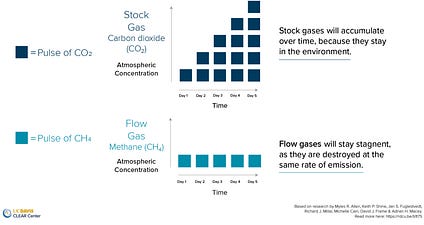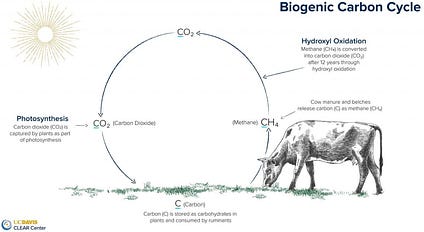Livestock, Methane, and Misinformation

As discussed in the article below, “…grouping livestock emissions within those from fossil fuels leads to false conclusions about livestock’s climate impact.”
NOTE: this article was originally published to Regeneration’s Substack. It was written by Meg Chatham.
“Scientists are worried about the rise in methane emissions as the world heats up and ‘cows in particular’ are to blame,” says a recent article in Fortune.
But this article (like many others in recent media) fails to mention that methane produced biogenically is a part of the earth’s natural system and is fundamentally different than carbon dioxide and emissions from fossil fuels.
As clearly explained in this CLEAR Center article and accompanying Rethinking Methane video, biogenic methane (from cattle), which is derived from atmospheric carbon, is a short-lived flow gas that lasts in our atmosphere for about 12 years, whereas carbon dioxide is a stock gas that accumulates in our atmosphere for approximately 1,000 years. The initial emission pulse of methane creates a warming effect. Indeed, methane is a potent greenhouse gas with a warming potential that can’t be ignored.
However, given that methane is a flow gas, if its emission rate stabilizes, it will ultimately be destroyed at the same rate that it is produced and thus will not increase warming. If methane emissions decrease, cooling will occur.
By contrast, every time you burn fossil fuels, the released CO2 tops off the cumulative CO2 stock that has been gathering for the past 1,000 years. In other words, even if CO2 emissions decline, warming will continue because the previously released CO2 (over the past 1,000 years) remains in the atmosphere.

In elucidating how biogenic methane recycles carbon, Mitloehner’s teamexplains:
“As part of the biogenic carbon cycle, plants absorb carbon dioxide, and through the process of photosynthesis, they harness the energy of the sun to produce carbohydrates such as cellulose. Indigestible by humans . . . ruminant animals . . . break it down in their rumens, taking the carbon that makes up the cellulose they consume and emitting a portion as methane, which is CH4 (note the carbon molecule). After about 12 years, the methane is converted into carbon dioxide through hydroxyl oxidation. That carbon is the same carbon that was in the air prior to being consumed by an animal. It is recycled carbon.”

But grouping livestock emissions within those from fossil fuels leads to false conclusions about livestock’s climate impact.
As revealed in a report from Climate TRACE, much of the oil and gas sector has underreported their emissions. With our scarce means of holding sector participants accountable, the report states that the sector’s emissions can be as much as THREE TIMES HIGHER than originally published.
Comparing livestock emissions with those from fossil fuels is not only a red herring for the oil and gas sector to continue business-as-usual, but it also falsely vilifies a nutrient-dense, traditional food and distracts us from solving our biggest problem: our addiction to fossil fuels.
Scapegoating and eliminating livestock without regard for how food is produced does nothing to encourage better earth stewardship.
We don’t have a livestock problem, we have a farming problem. Since the era of agriculture where then-Secretary Earl Butz told farmers to get big or get out, our food production system has focused on one goal alone: yield.
As a result, our yield-obsessed food system has compromised environmental outcomes, food security, quality, and safety, and farmers’ mental health and access to reasonable income.
Swapping out meat and other animal foods for plant-based burgers and other meat substitutes won’t fix the underlying problems in our food system. Telling consumers to just switch out meat for substitutes would be like telling consumers to simply install different upholstery in their vehicles instead of exploring ways to reduce their fossil fuel dependence.
To improve agriculture’s relationship with the environment and human health, we need to encourage farmers to adopt different practices throughout the entire system – not just in livestock production. Fake meat companies claim their soy burgers can save the planet yet fail to provide consumers with any information about how those soybeans were grown. Did farmers use cover cropping? No-till drilling? An abundance of chemicals like pesticides and herbicides?
Regenerative agriculture can play a key role in methane reduction
In healthy soils that are part of vibrant regenerative ecosystems incorporating rotational grazing and avoiding agricultural chemicals and tillage, methanotrophic bacteria help consume methane expelled by ruminants. Josh Tickell in Kiss The Ground says, “The Earth has a number of methane-balancing mechanisms that include soil-based methanotrophic bacteria that absorb methane produced by grazing ruminants.”
Allen Williams further explains that there were hundreds of millions of grazing ruminants for several thousand years without a methane problem. CAFOs, monocultures, pesticides, fungicides, herbicides, synthetic fertilizers, and tillage have degraded our soil and eliminated methanotrophs that digest methane. Furthermore, because synthetic nitrogen fertilizer production (through fracking) generates as much methane as CAFOs, crops grown with such fertilizers are arguably a more significant source of methane than CAFO beef.
Cattle have been disproportionately blamed for methane emissions and the impact on global warming from ruminant methane has been substantially exaggerated. We cannot overwhelmingly point to all cows as methane culprits without considering how they are being raised and without honestly evaluating how much methane is produced by fossil fuels, rice farming, or synthetic fertilizers used for crops.
Ponder:
An excerpt from FS (Farnam Street) Sunday Brain Food newsletter. “We tend to think that what we think is true. And because we think something is true, we ignore information that might tell us it’s not true.
Charles Darwin deliberately looked for thoughts that disagreed with his own. He wrote, ‘Whenever a published fact, a new observation or thought came across me, which was opposed to my general results, to make a memorandum of it without fail and at once; for I had found by experience that such facts and thoughts were far more apt to escape from memory than favorable ones.’
Darwin was out for truth, not to confirm his view of the world.”
Read:
How the Environmental Movement Can Find Its Way Again by Charles Eisenstein. “The ecological crisis and the spiritual crisis that we call “mental health” share a common source: denial of earth as a living being, worthy of love, worthy of service. The conservationist draws from a well of truth: that the purpose of a human being is to participate in the flourishing of life. To serve with. Sundered from that purpose, we inevitably become sick. That inner sickness, that soul sickness, reflects the outer sickness of ecosystems. Could there ultimately be any doubt that the global climate reflects the social climate, the political climate, the economic climate, and the psychic climate?”
Listen:
Sara Place on the Meet Your Herdmates Sodcast There are many people who know something about ruminant animal agriculture and the essential role it plays in meeting the needs of today’s world and the world of 2050. Sara Place, Ph.D. is one such expert. Tune into this podcast to learn the role of ruminants in a sustainable future.
Disclaimer: The Regeneration Weekly receives no compensation or kickbacks for brand features – we are simply showcasing great new regenerative products.
If you have any products you would like to see featured, please respond to this newsletter or send an email to meg(at)soil.works
Thank you for reading The Regeneration. This post is public so feel free to share it.
The Regeneration is brought to you by Soilworks | Wholesome Meats | Cream Co. Meats | Grassroots Carbon | Grazing Lands | RangeWard
Thanks for reading The Regeneration! Subscribe for free to receive new posts and support my work.
—
For more posts like this, in your inbox weekly – sign up for the Restoring Diversity Newsletter
